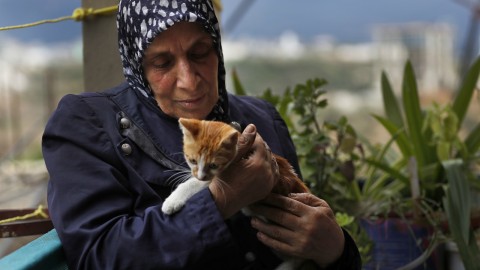U.S. travel ban leaves far-flung Syrian family in limbo
Dahouk al-Omar has been hoping to be reunited with a son in Chicago. Now it's uncertain whether that will ever be possible.

Tired and aching with arthritis, Dahouk al-Omar lugs a purse stuffed with her personal documents to the catering kitchen where she works 12 hours a day. As an unregistered refugee in Lebanon, the 68-year-old never knows when she may need them to prove her identity or in case she gets stopped by the police.
Al-Omar spends half her salary on rent for the cramped apartment she shares with a son and two cats, an arrangement that she has hoped would be temporary. She has another son in Chicago who has been looking into ways of bringing her there.
But then came the election of Donald Trump and the travel ban on several Muslim-majority countries enacted days after his inauguration. The move ignited a months-long legal battle that plunged countless Syrian refugees into uncertainty and put plans to reunify families on hold.
Read our latest issue or browse back issues.
When the Supreme Court upheld the ban in June, it plunged the family into a fog of confusion about who can get a waiver, how family members can be reunited, at what cost, and how long it may take.
A backlog of cases built up as the Trump administration worked its way through different versions of the travel ban, the first of which barred Syrian refugees until further notice. Trump also reduced the global number of refugees the U.S. is willing to absorb in 2017 from 110,000 to 50,000.
[In late June the U.S. Supreme Court ruled 5–4 in Trump v. Hawaii to allow a third version of the travel ban, deferring to the executive branch’s right to restrict entry to foreign nationals. The Christian Science Monitor reported that Chief Justice John Roberts’s majority opinion noted “three other features of the travel ban that ‘support the Government’s claim of a legitimate security interest’: the fact that Iraq, Sudan, and Chad (all Muslim-majority countries) had been removed from the order; that the order includes ‘significant exceptions’ for certain categories of foreign nationals; and that the order creates a waiver program through which immigrants can be granted exemptions from the order.”
Justice Sonia Sotomayor wrote in a dissent, joined by Justice Ruth Bader Ginsburg, that the court failed “to safeguard that fundamental principle” of religious neutrality. The dissent listed several examples of statements made by Trump or members of his administration showing anti-Muslim bias. Sotomayor accused the court majority of hypocrisy in ignoring those statements, given that in its decision in the Masterpiece Cakeshop case the court gave weight to Colorado officials’ statements of hostility toward a baker’s religious beliefs.]
The travel ban has thrown yet another obstacle in the way of Syrian refugees whose status is already uncertain.
Al-Omar was never registered as a refugee when she arrived in Lebanon in 2016. The tiny country of 5 million, which is hosting more than 1 million Syrian refugees, asked the United Nations to stop registering refugees in 2015, hoping to deter new arrivals. Nevertheless, there are an estimated 500,000 unregistered Syrians in Lebanon.
UN officials say al-Omar’s unregistered status should not prevent her from qualifying for reunification, but even experts express confusion about the ban.
“We don’t know what could pass, what couldn’t,” said Suzanne Sahloul, of the Chicago-based Syrian Community Network, which helped al-Omar’s son and his family resettle. “Before there was clarity. Now we don’t know what to do.”
Fadi Omarin, al-Omar’s 48-year-old son, has not seen his mother since 2012, when he first fled Syria.
“I hope I can see her before something happens to her or to me,” Omarin said, speaking from Chicago, where he resettled in 2015.
Stuck in limbo, al-Omar relies on her catering job and the kindness of others. Her youngest son’s friends donated kitchen appliances and mattresses, and Omarin wired money from Chicago so she could buy a bed and some chairs.
“I have to work to be able to survive,” she said. “Thanks to God, who is giving me the strength.”
She breaks into tears when she recalls the help they received from her older son: “God bless him. He takes care of us, even when he is far. If he was close, he would never have left us in these conditions.”
Omarin was the first family member to flee the war, when the government launched an offensive in their hometown of Baba Amr, in central Syria. His wife’s brother and father were killed, and their home was destroyed. He lived in hiding in Damascus for several weeks before fleeing to Lebanon, where he registered with the UN and was eventually chosen for resettlement in the United States. Another of al-Omar’s sons resettled in Switzerland, a daughter lives in Sudan, and another is in Jordan.
Omarin said he is happy in Chicago and grateful that his children are growing up in a place that offers comforts and freedom. He wishes his mother could join them: “I want [Trump] to imagine if the same thing happened to him and there were problems and war in his country, and his son was in one place and his wife in another. What would he be thinking? Will he be happy that they are not reunited?”
Al-Omar’s life was never easy. As a newlywed, she moved to Lebanon only to have to flee the civil war there with her husband and children in 1975. Her husband was abusive, and for a time she left him, though she returned to care for him in the months before he died. Syria’s civil war has scattered her family and fueled disputes among them. She is no longer on speaking terms with one of her sons.
After Omarin left in 2012, al-Omar’s youngest son, Mohammed, stayed with her in Syria, where he endured his own harrowing ordeal. After being conscripted and serving for a year and a half, mostly guarding a military installation, he was trained by an elite unit. Fearing that he would be sent to the front lines, he smashed his knee against a wall in order to give himself a permanent disability.
“I didn’t want to be part of the bloodbath,” he said, massaging a loose bone on his left knee.
By that time his mother had already made the difficult journey across the war-torn country. She crossed over the rugged Lebanese border in 2016, traveling alone with her documents and a few family pictures, paying hundreds of dollars to smugglers. He joined her a month later.
As she made her way to work one Saturday, al-Omar broke into a smile. Her first name, Dahouk, means “the smiley one.”
“I laugh sometimes,” she said. “But I have seen a lot. I have moved a lot. And now I am very tired.” —Associated Press
A version of this article, which was edited August 2, appears in the print edition under the title “U.S. travel ban leaves Syrian family in limbo.”






